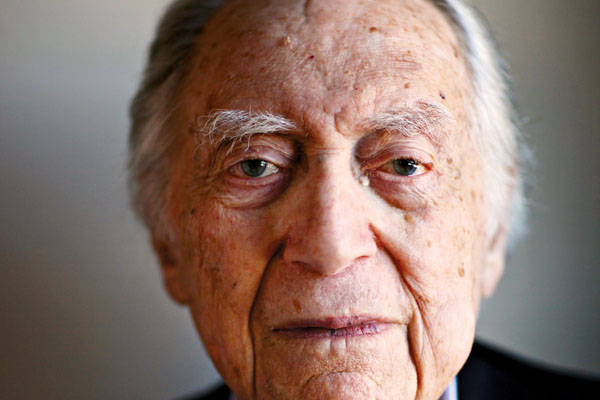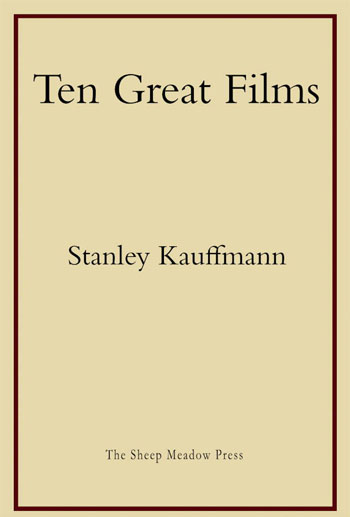Yesterday, with a powerful collection of tributes and a selection of outstanding reviews, the New Republic announced that Stanley Kauffmann, who wrote about films for the magazine for over half a century, had died. He was 97. My copy of Kauffmann’s 1966 book A World on Film has been lost for years, but the clarity and confidence of the prose must have made a lasting impression; it’s one of the first books of film criticism I remember reading.
“Mr. Kauffmann went from being an actor and a stage manager with a Manhattan repertory company to a book editor and a writer of vaguely philosophical novels before becoming a film critic at the New Republic in 1958,” writes William Grimes in the New York Times. “His reflective, highly wrought essays appeared weekly for the next 55 years, with a break in 1966, when he was, briefly, the chief theater critic for the New York Times. He also doubled as the theater critic for the New Republic from 1969 to 1979, but it was as a film critic that his influence was felt, even if it was hard to define, since he belonged to no camp. His abiding interest in theatrical givens like theme, story, dramatic construction and character could make him seem old-fashioned, and set him in direct opposition to the auteur school, with its emphasis on the formal aspects of film. Readers came to him for reviews that read like mini-tutorials, the product of a deeply literary mind and a graceful pen.”
From TNR‘s tributes by David Denby, James Wolcott, Jed Perl, David Thomson, Chloe Schama, and Laura Bennett, the Dissolve‘s Matt Singer highlights this passage from Denby: “If I may put it a little baldly, Stanley electrified educated people with the news that movies had become one of the high arts again, and that there were contemporary works—by Bergman, Truffaut, Antonioni, and many other directors—the equal of the masterpieces of the silent era. At the same time, he fought unfailingly, then and forever after, against kitsch of every kind.” And among the reviews TNR has reposted are Kauffmann’s pieces on L’Avventura (1961) and 8½ (1963).
Criticwire‘s Sam Adams has collected more tributes, many of them tweeted by fellow critics, and notes that, when Kaufmann was a literary agent, he helped Walker Percy “shape The Moviegoer into its final form.”
Here’s how Time‘s Richard Corliss begins his tribute; dare you not to read on: “I spent time with Stanley Kauffmann only once, in December 1971, at a Modern Language Association seminar in Chicago. He, the distinguished film critic of the New Republic since 1958, and I, a pup who edited Film Comment magazine and wrote freelance for the Village Voice, appeared on a panel about, I think, movie screenwriting. That afternoon we sat together on a flight back to New York City, and he was most generous in chatting with someone who was born the year Stanley wrote a play, Bobino, in which Marlon Brando made his professional acting debut.”
Kauffmann “will be remembered for his intellectually rigorous, neatly manicured film reviews—the meditative yin to Pauline Kael’s ecstatic yang,” writes Charles McNulty in the Los Angeles Times. “But as a drama critic, I’m especially grateful for his equally acute body of drama criticism, which is a tonic to read in this age of trumped-up enthusiasms and attention-grabbing pans.”
“To Mr. Kauffmann, the most fundamental quality in his profession was ‘moral rigor—a commitment to the art, a passion to see it improve, a disregard for any kind of popularity.'” Adam Bernstein in the Washington Post:
Mr. Kauffmann may have lacked the prominence of Pauline Kael at the New Yorker or Andrew Sarris at the Village Voice, but he was nonetheless a central player in the passionate arguments about film aesthetics that in the 1960s and ’70s filled pages of publications noted for their long-form, provocative cultural criticism.
In the 1960s, he coined the term ‘film generation’ to describe the phenomenon of young film fanatics who rushed to the bijou to see the latest offerings from avant-garde European directors including Jean-Luc Godard and the occasional American maverick such as Sam Peckinpah….
In a 1974 essay, “Why I’m Not Bored,” Mr. Kauffmann wrote that the movies, no matter how unpromising, still captured his attention. He explained: “No matter how much I know about a film’s makers or its subject before I go, I never really know what it’s going to do to me. Depress me with its vileness, or just roll past, or change my life in some degree, or some combination of all three, or affect me in some new way that I cannot imagine.”
Update, 10/11: Sean Howe notes that Kauffmann worked briefly “an editor at Fawcett Comics. During World War II, Kauffmann briefly presided over not just Mary Marvel, but also her not-quite-as-renowned WOW COMICS costars, like Mr. Scarlet and Pinky, Commando Yank, and Helpful Hugo.” Howe adds that, while Kauffmann could, in his own words, “see the moving from box to box as camera shots,” he never took comics seriously and left Fawcett in 1944. “His replacement? Patricia Highsmith.”
Update, 10/14: “Acutely aware of his own status as a Jewish writer, Kauffmann was suspicious of expressions of the Holocaust in the arts,” writes Benjamin Ivry for Forward. “Onscreen in later years, the Holocaust was a more acceptable theme for Kauffmann, especially the French Jewish director Claude Lanzmann’s Shoah (1985), which he recalled in 2001: ‘Claude Lanzmann made Shoah. That four-word sentence, for me, is chiseled in rock. A monument, a monumental achievement. Lanzmann’s nine-hour documentary about the Holocaust is more than a work to be praised: it is a gigantic block of evidence for future beings on this planet, more elevated than us, I hope, to show them some of the profound darkness that had been possible in the past.’ Kauffmann also admired Spielberg’s Schindler’s List (1993) so much that he wrote two articles to say so, in 1993 when the film was released and again in 1994. Yet he loathed other fictional attempts, such as Roberto Benigni’s Life is Beautiful (1997), calling its plot ‘blatantly impossible… theatrically phony… an actor’s shallow conceit.'”
Update, 11/10: TNR‘s posted a new and wide-ranging collection of reviews, “Half a Century at the Movies.”
For news and tips throughout the day every day, follow @KeyframeDaily on Twitter and/or the RSS feed. Get Keyframe Daily in your inbox by signing in at fandor.com/daily.





